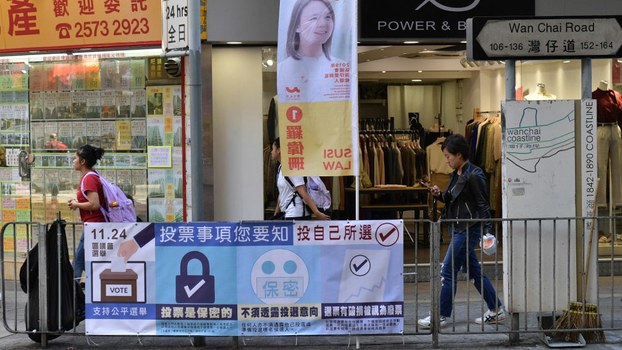




When Hong Kong's voters go to the polls on Sunday to choose a new generation of district councillors, they will be greeted with a now-familiar sight: the city's hugely unpopular police force.
In a poll that has been marred by the disqualification on political grounds of former 2014 student leader Joshua Wong and violent attacks on candidates of all political stripes, voters will get the chance to speak through the ballot box for the first time since pro-democracy and anti-extradition protests escalated nearly six months ago.
Police commissioner Chris Tang said on Friday that police will be out in force at polling stations Sunday to respond to any outbreak of violence “without hesitation.”
Tang Chun-Keung, head of the Hong Kong Association of the Heads of Secondary Schools, said a handful of people -- around 10 -- now remain inside Poly U, including minors, and they are in an emotionally unstable state.
"We have lawyers and social workers ready to provide assistance and we hope to persuade them to leave the campus," he said. "We are worried our work is getting more and more difficult because students are refusing to meet us."
Police have said that those under 18 can leave after giving their details, although they may face later arrest. Adults will be arrested on suspicion of "rioting."
Pro-democracy groups are hoping for a decisive victory as public support for the administration of chief executive Carrie Lam and pro-Beijing parties plummets, and as hundreds of thousands of young people join the ranks of the electorate for the first time.
But their numbers could be balanced out by an aging population that has 44 percent of voters in the more traditionally conservative 36-60 age group.
Currently, pro-democracy parties only account for 120 seats in District Councils, with pro-China members taking up nearly 300 seats.
A total of 452 seats across 18 councils are up for grabs in the city's only directly democratic election.
Postponement fears
Chung Kim-wah, assistant professor of social policy at Poly U, said the elections have generally played more of a symbolic role, rather than wielding real political power.
He said concerns remain that the government will postpone or cancel the elections altogether.
"Even if only 10 councils fall into pro-democracy hands ... then maybe pro-democracy members will eventually balance out pro-government seats in the Legislative Council (LegCo)," Chung said.
"It actually makes more sense for the government to cancel the elections in such a scenario," he said, adding that the current district councils could just carry on indefinitely under government control.
Democracy activist and former City University politics lecturer Joseph Cheng said there are still many uncertainties, however.
"Maybe some districts will change hands, but it's very hard to change the overall situation," Cheng said.
An Islands District voter surnamed Hui said she hadn't planned to vote until she saw footage of pro-China gangsters attacking passengers and protesters in Yuen Long MTR station on July 31, and police failing to respond.
"I think this time is different, and it means a lot," she said. "Everyone knows who they should be voting for. I think the power of unity is very important."
"It would be best if we could kick out these useless [pro-government] people, or turn them into a minority that has to obey our majority," Hui said. "That way, our lives will be much better."
A Wong Tai Sin voter surnamed Cheung said he has never seen a district councillor from his area.
"What do they do to earn that H.K.$100,000 a month? I have no way of understanding it; I don't know how it works," Cheung said.
"I don't know if my one vote can make a difference," he said. "Personally, I would prefer the [pro-China] Democratic Alliance (DAB) to win."
Diminished faith in voting
An 18-year-old first-time voter surnamed Mak said she wants to vote for pro-democracy candidates in her home district of Tung Chung.
"I'm afraid the pro-establishment party will win," Mak, who has taken part in the protest movement, said. "The incumbent is a democrat, and I want to see him re-elected because I want the best for Hong Kong, and I don't want it to fall into the hands of the DAB."
"There is a feeling that voting is pointless, but it doesn't mean that it is," Mak said. "If you don't vote, then Hong Kong's defeat will be on your head. It's up to the people of Hong Kong to make their choice."
Chung said the stripping of LegCo seats from six pro-democracy lawmakers in 2016 after their oaths of allegiance were judged invalid by Beijing had diminished people's faith in the electoral system.
And the attempt by chief executive Carrie Lam to bring in amendments allowing extradition to mainland China compounded that feeling, he said.
"Everyone saw that the Executive Council, LegCo and the district councils all supported the government unconditionally, and that the government was bold enough to push the amendments through LegCo even after tens of thousands and then two million people took to the streets," Chung said.
"Everyone was made aware of how absurd this system is," he said.
Reported by Tseng Yat-yiu, Lau Siu-fung, Lu Xi, Lee Tsz-Tsz and Tam Siu-yin for RFA's Mandarin and Cantonese Services. Translated and edited by Luisetta Mudie.